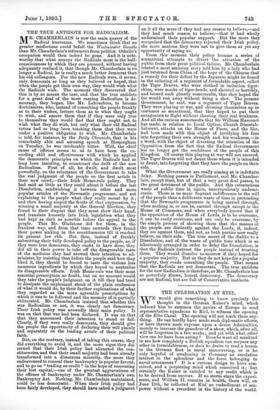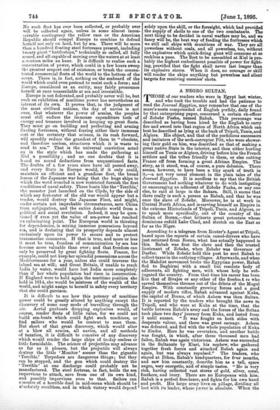THE CELEBRATION AT _KIEL.
would give something to know precisely the thought in the German Kaiser's mind, which induced him to summon the navies of Europe to send. representative squadrons to Kiel, to witness the opening of the Elbe Canal. The opening will not teach them any- thing. He can hardly have made such diplomatic efforts, or have thrown such expense upon a dozen Admiralties, merely to increase the grandeur of a show, which, after all, will be forgotten in a few weeks; and yet with what other view can he have been acting ? Does he want all mankind to see how completely a British squadron can surpass any other in formidableness, or does he desire to read a lesson to the German fleet in naval manceuvring, or is he only hopeful of awakening in Germany an emulative interest in the splendour and the force belonging to naval armaments ? It is a curious design to have con- ceived, and a perplexing mind which conceived it ; but certainly the Kaiser is entitled to any credit which is to be derived from success. If no storm stays the experi- ment, and William IL remains in health, there will, on June 19th, be collected at Kiel an embodiment of sea- power without a precedent in the history of the world. No such fleet has ever been collected, or probably ever will be collected again, unless in some almost incon- eeivable contingency the yellow race or the American Republic should compel Europe to combine to defend herself not only on land, but by sea. There will be more than a hundred floating steel fortresses present, including twenty giant "battleships," technically so called, all fully armed, and all capable of moving over the waters at at least s,venteen miles an hour. It is difficult to realise such a concentration of power, which could in a few hours sweep the greatest seaport out of existence, or brush the concen- trated commercial fleets of the world to the bottom of the ocean. There is, in fact, nothing on the seaboard of the world which could even pretend to resist such a force ; and Eurcpe, considered as an entity, may fairly pronounce herself at once unassailable at sea and irresistible.
Europe is not federated, and probably never will be, but such an exhibition of maritime power has nevertheless an interest of its own. It proves that, in the judgment of the most civilised nations, the day of navies is not over, that whatever the power of armies, the peoples must still endure the immense expenditure both of energy and treasure involved in keeping up great fleets. They must go on building and perfecting and arming floating fortresses, without fearing either their immense cost or the certainty that science, in its rush forward, will speedily reduce the grandest of them to "obsolete, and therefore useless, structures which it is waste to send to sea." That is the universal conviction acted on in the style which has made the gathering at Kiel a possibility ; and no one doubts that it is b Ised on sound deductions from unquestioned facts. The doubts of a few years since have all passed away, and every State in Europe would, if it only could, maintain an efficient and a grandiose fleet, the broad lesson of the Japanese war being that the huge ships to which the word ironclad is now restricted furnish the first conditions of naval safety. Three boats like the Terrible,' the monster just launched on the Clyde, by the side of which any first-rater of the old war would appear but a tender, would destroy the Japanese Fleet, and might, under certain not improbable circumstances, save China from subjugation, and the entire Asiatic world from a pelitical and social revolution. Indeed, it may be ques- I jelled if even yet the value of sea-power has reached its culminating point. The European world is thirsting for dependencies, is seizing immense possessions beyond sea, and is declaring that its prosperity depends almost exclusively upon its power to secure and to protect transmarine commerce. If that is true, and more or less it must be true, freedom of communication by sea has become more valuable than ever ; and that freedom can only be preserved by great fighting fleets. France, for -example, could not keep her splendid possessions across the Mediterranean for a year, unless she could traverse the inland sea at will; and Great Britain, if unable to reach India by water, would have lost India more completely than if her whole population had risen in insurrection. If England were to hold again the maritime position she held in 1814, she would be mistress of the wealth of the world, and might assign to herself in safety every territory that she could garrison.
It is difficult to see how this potency of maritime power could be greatly altered by anything except the discovery of some easy mode of travelling through the air. Aerial gunboats dropping explosives would, of course, render fleets of little value, for we could not build sea-boats which could fight such machines, or find sailors who would be content to man them. But short of that great discovery, which would alter at a blow all armies, all navies, and all methods of taxation, it is difficult to conceive of any discovery which would render the large ships of to-day useless or little formidable. The science of projectiles may advance as far as it pleases, but the projectile will always destroy the little Monitor' sooner than the gigantic Terrible.' Torpedoes are dangerous things ; but they can be stopped, and the gun which could destroy the Terrible' at one discharge could probably not be manufactured. The steel fortress, in fact, holds the sea impervious to attack, save from one of its own kind, and possibly impervious even to that. Sailors can conceive of a horrible duel in mid-ocean which should be a'nolutely resultless, and in which victory would depend solely upon the skill, or the foresight, which had provided the supply of shells to one of the two combatants. The next thing to be decided in naval warfare may be, and we fancy will be, the best way of feeding the fortresses which we still call ships with munitions of war. They are all powerless without coals, and all powerless, too, without the explosives which quick-firing guns will consume at so reckless a pace. The fleet to be assembled at Biel is pro- bably the highest embodiment possible of power for fight,. ing, provided that the fight shall never last longer than its explosive stores. When it does, no courage or skill will render the ships anything but powerless and silent targets for receiving enemies' shots.







































 Previous page
Previous page